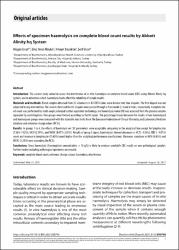Effects of specimen haemolysis on complete blood count results by Abbott Alinity hq System
Citation
Ercan, M., Akbulut, E. D., Bayraktar, N., & Ercan, Ş. (2021). Effects of specimen haemolysis on complete blood count results by Abbott Alinity hq System. Biochemia medica, 31(3), 0-0.Abstract
Introduction: The current study aimed to assess the interference of in vitro haemolysis on complete blood count (CBC) using Abbott Alinity hq
system, and to determine which haemolysis levels affect the reliability of sample results.
Materials and methods: Blood samples obtained from 25 volunteers in K3-EDTA tubes were divided into four aliquots. The first aliquot was not
subjected to any intervention. The second, third and fourth aliquots were passed through a fine needle 2, 4 and 6 times, respectively. Complete blood count was performed by multi-angle polarized scatter separation technology and haemolysis index (HI) was assessed from the plasma samples
separated by centrifugation. Five groups were formed according to the HI values. The percentage biases between the results of non-haemolysed
and haemolysed groups were compared with the desirable bias limits from The European Federation of Clinical Chemistry and Laboratory Medicine
database and reference change values (RCVs).
Results: In groups 1 to 4, the effects of haemolysis on CBC parameters were acceptable comparing to the analytical bias except for lymphocytes
(7.26%-7.42%), MCH (2.59%), and MCHC (0.47%-2.81%). Results of group 5 (gross haemolysis) showed decreases in HCT(- 4.56%), RBC (- 4.07%)
count and increase in lymphocyte (11.60%) count higher than the analytical performance specifications. Moreover, variations in MCH (4.65%) and
MCHC (5.24%) were exceeding the RCVs.
Conclusions: Gross haemolysis (haemoglobin concentration > 10 g/L) is likely to produce unreliable CBC results on non-pathological samples.
Further studies including pathological specimens are needed.
















